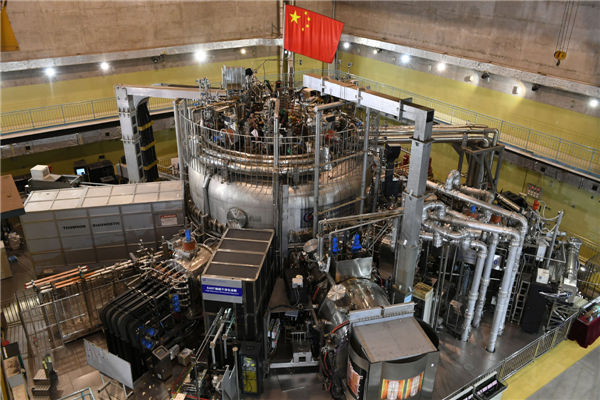Hefei charts plans to bolster research on major cutting-edge technologies
 |
|
EAST, also called "artificial Sun", is being manufactured at Hefei Institutes of Physical Science under the Chinese Academy of Sciences, on Aug 16, 2018. [Photo/Xinhua] |
Hefei, capital of Anhui province-a comprehensive national science center and an important player in the integrated development of the Yangtze River Delta region-will ramp up efforts to push forward with innovative development in collaboration with Zhangjiang Science City in Shanghai, another national science center, as stated in an action plan earlier this year.
A plan describing how Anhui is going to serve regional integration, released on Jan 16 by the province's development and reform commission, makes it clear that using the innovation resources of Hefei and Shanghai, the two science centers will work together to bolster research into cutting-edge key technologies with an aim of elevating the country's overall innovation capacities.
As both cities are located in the Yangtze River Delta region, the two centers are expected to construct world-leading facilities to drive forward scientific and technological development of the delta region, according to the plan.
The goal of building Hefei into a comprehensive national science center, following Shanghai's Zhangjiang, began in February 2017.
It will focus on research of information technology, energy, health and the environment, while Zhangjiang will seek breakthroughs in the fields of energy, information, materials, life sciences, environment and advanced manufacturing.
Currently, five large-scale scientific facilities have been built and put into operation in Hefei, which helps ensure that the city holds the lead in quantum information and nuclear fusion worldwide. In Zhangjiang, a total of 14 facilities are being constructed.
The two centers are designed to have different focuses but will be able to cooperate in various ways.
In 2017, a quantum center was set up at the Shanghai Institute for Advanced Studies of the University of Science and Technology of China-a Hefei-based university-marking a big step in cooperation between Hefei and Zhangjiang.
Two years later, the quantum center announced plans to build another research center for quantum science in Shanghai in a bid to unite top-notch research agencies at home and abroad for coordinated research.
iFlytek Co Ltd, a leading Chinese artificial intelligence company based in the Hefei National High-tech Industry Development Zone, established a strategic partnership with Shanghai in September 2018 to promote applications of AI technology in the fields of education, healthcare, smart cities and automotive electronics in Shanghai.
Fang Xiangmin, deputy director of the zone's administrative committee, said as a major participant in the construction of the national science center, the high-tech zone is seeking effective ways to promote exchanges and cooperation with Shanghai, as well as other areas in the delta region.
"The Hefei government has been offering help for high-tech companies to strengthen cooperation with Shanghai and we've seen some good results in company-to-company interactions," Fang said.
As cooperation between Hefei and Zhangjiang is still in its early stages, Fang added that a systematic and coordinated management mechanism is needed to improve efficiency when furthering exchanges and cooperation between the two national science centers.
Qin Jirong contributed to the story.















